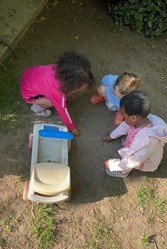
The early childhood years present an important opportunity to support children’s social and emotional development. Outdoor play has been associated with positive outcomes in children’s well-being, social, emotional and cognitive development. As an urban region, Brussels is characterized by a high population density. For many citizens, the access to private gardens or to small scale green spaces is limited. Daycare centre Barbara therefore wants to offer children the opportunity to enjoy outdoor and free-led play in their garden. They strive for a first acquaintance with nature as well as the feeling of complete freedom that the outdoors brings and in this way supporting their mental well-being and social and emotional development.
Spending more time in unstructured, free-led play can create positive outcomes in terms of self-regulation. As children are exploring the world by themselves, they are challenged in making own choices and handling emotions. Self-awareness and self-confidence are being supported, as children discover what they like to do and what they dislike. During the playtime in the garden, children choose whether they are playing alone or play together with other children and so working on their social awareness and relationship skills. The outdoor environment, also stimulates fantasy and creativity as children engage themselves in pretend-play like for example a ‘treasure’ hunt.
No day is the same as the previous one. There is always something new to discover. When they see the dirt on the children's clothes, parents immediately realise that their children had a lovely day and great fun in the garden. The collected treasures are proudly removed from the pocket and displayed with a proud smile!
Ng, S.C., Bull, R., (2018). Facilitating social emotional learning in kindergarten classrooms: Situational factors and teachers' strategies. International Journal of Early Childhood, 50(3), 335-352
Rosiek, M. A., Can We Play Outside? Social and Emotional Learning and Preschooler Physical Activity during Outdoor Play. (2020). [dissertation] 60 pp.
Colliver, Y., Brown, J. E., Harrison, L. J., & Humburg, P. (2022). Free play predicts self-regulation years later: longitudinal evidence from a large Australian sample of toddlers and preschoolers. Early Childhood Research Quarterly, 59, 148-161. https://doi.org/10.1016/j.ecresq.2021.11.011